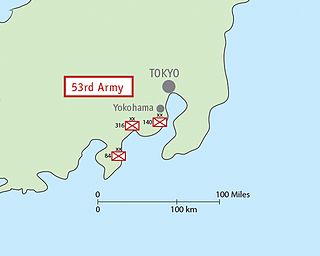| Japanese Fifty-First Army | |
|---|---|
Landing Map for Operation Downfall | |
| Active | April 18, 1945 – August 15, 1945 |
| Country | Empire of Japan |
| Branch | Imperial Japanese Army |
| Type | Infantry |
| Role | Corps |
| Garrison/HQ | Tsuchiura, Ibaraki |
| Nickname(s) | Ken(建Build) |
| Engagements | Operation Downfall |
The Japanese 51st Army(第51軍Dai-gojyūichi gun) was an army of the Imperial Japanese Army during World War II.

Corps is a term used for several different kinds of organisation.

The Imperial Japanese Army was the official ground-based armed force of the Empire of Japan from 1868 to 1945. It was controlled by the Imperial Japanese Army General Staff Office and the Ministry of the Army, both of which were nominally subordinate to the Emperor of Japan as supreme commander of the army and the navy. Later an Inspectorate General of Aviation became the third agency with oversight of the army. During wartime or national emergencies, the nominal command functions of the emperor would be centralized in an Imperial General Headquarters (IGHQ), an ad-hoc body consisting of the chief and vice chief of the Army General Staff, the Minister of the Army, the chief and vice chief of the Naval General Staff, the Inspector General of Aviation, and the Inspector General of Military Training.

World War II, also known as the Second World War, was a global war that lasted from 1939 to 1945. The vast majority of the world's countries—including all the great powers—eventually formed two opposing military alliances: the Allies and the Axis. A state of total war emerged, directly involving more than 100 million people from over 30 countries. The major participants threw their entire economic, industrial, and scientific capabilities behind the war effort, blurring the distinction between civilian and military resources. World War II was the deadliest conflict in human history, marked by 50 to 85 million fatalities, most of whom were civilians in the Soviet Union and China. It included massacres, the genocide of the Holocaust, strategic bombing, premeditated death from starvation and disease, and the only use of nuclear weapons in war.














